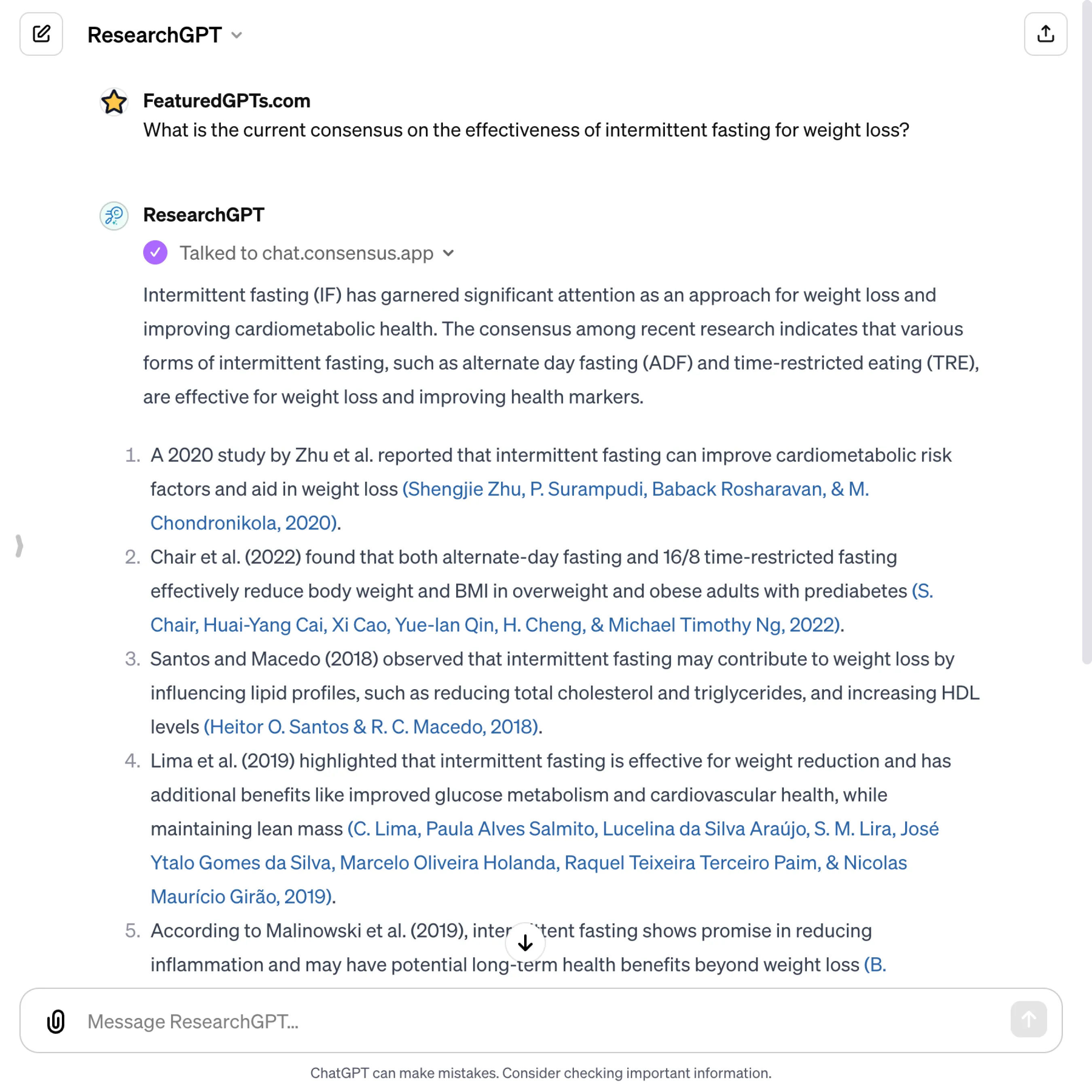
Consensus
I search scientific papers, synthesize evidence, draft content, and cite using APA format.
What does Consensus do? (& its Use Cases)
Consensus helps you access and synthesize scientific research easily.
It transforms complex queries into research-focused questions, providing evidence-based answers from academic papers.
For Academics and Researchers
Facilitates deep dives into literature, offering comprehensive insights for academic writing and research.
For Students
Assists in understanding complex topics and preparing for projects or papers with credible sources.
For Content Creators
Provides scientifically backed information to enrich articles, blogs, or educational content.
How to Use Consensus?
How to get started with ResearchGPT?
Getting Started with ResearchGPT: A Guide for Efficient Research Assistance
Welcome to ResearchGPT, your dedicated research assistant designed to help you delve into scientific research with ease. This guide will walk you through how to use ResearchGPT effectively, covering a variety of use cases.
Basic Research Queries
- How to Use: Frame your questions in a research-oriented manner, focusing on the relationship or impact of specific concepts.
- Example: Instead of asking "Does being cold make you sick?", phrase it as "Does cold temperature exposure increase the risk of illness or infection?"
In-Depth Literature Searches
- How to Use: Request comprehensive searches on complex topics for detailed insights.
- Example: "What are the latest findings on the effectiveness of CRISPR in gene editing?"
Evidence Synthesis
- How to Use: Seek synthesized evidence from multiple studies for a consolidated view.
- Example: "What is the consensus on the impact of meditation on stress reduction?"
Drafting Academic Content
- How to Use: Utilize ResearchGPT for drafting sections of academic papers, ensuring to cite relevant studies.
- Example: "Draft an introduction on the role of artificial intelligence in healthcare, citing recent studies."
Blogging and Article Writing
- How to Use: Request assistance in writing blogs or articles that require scientific backing.
- Example: "Write a blog post about the advancements in renewable energy technologies, supported by recent research."
Data Interpretation and Analysis
- How to Use: Inquire about data or results interpretation from specific studies or fields.
- Example: "Can you interpret the results of the 2020 study on climate change impacts on marine life?"
Comparative Analysis
- How to Use: Compare findings or theories from different studies for a broader perspective.
- Example: "Compare the effectiveness of different COVID-19 vaccines based on recent research."
Key Features to Remember:
- Search with Technical Language: Use specific and technical language for better search results.
- Citations Included: Every response will include APA in-line citations with hyperlinked sources.
- Simple Language Preference: Responses are in easy-to-understand language unless specified otherwise.
- Custom Requests: Feel free to ask for specific formats or styles in responses.
Use ResearchGPT as your go-to tool for navigating the complex world of scientific research with ease and efficiency!
Consensus's Testing Performance
Consensus's Core Features
Research-Oriented Search
Transforms complex queries into research-focused questions, using scientific papers to provide precise, evidence-based answers. Ideal for users needing reliable, academically grounded information.
Evidence Synthesis
Combines findings from multiple studies for a comprehensive perspective. Streamlines understanding of broad research topics by synthesizing key points from diverse sources.
APA Style Citations
Automatically provides APA in-line citations with hyperlinks, making it easy to reference and access original research papers. Essential for academic writing and research verification.
Academic Content Drafting
Assists in crafting sections of academic papers, blogs, or articles with a scientific foundation. Enhances the credibility and depth of written content with research-backed information.
Data Interpretation Assistance
Offers insights into complex data from scientific studies, aiding in interpretation and summary. Beneficial for researchers and students grappling with intricate data sets.
Comparative Research Analysis
Facilitates comparison of findings or theories from different studies, offering a broader, unbiased perspective. Ideal for in-depth analysis and understanding of evolving research topics.
FAQs from Consensus
Consensus's Prompt Examples
Research-Oriented Queries
What is the current consensus on the effectiveness of intermittent fasting for weight loss?
How does exposure to blue light affect sleep quality according to recent studies?
What are the potential environmental impacts of widespread electric vehicle adoption?
Academic and Content Writing
Draft an introduction for a paper on the role of artificial intelligence in personalized medicine, citing key research.
Write a summary of the latest findings on climate change impacts on ocean biodiversity for a blog post.
Create an outline for a review article on the advancements in renewable energy technologies, including major studies.
Comparative and Analytical Studies
Compare the efficacy of mRNA vaccines versus traditional vaccines in preventing infectious diseases.
Analyze the differences in mental health outcomes between mindfulness meditation and cognitive behavioral therapy.
Evaluate the impact of remote work on employee productivity and wellbeing in different industries.








